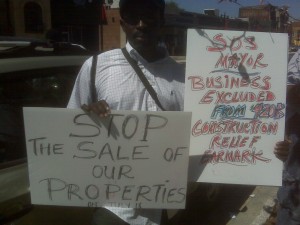Listen to Pamela Johnson and Bachir Diop HERE
Audio clip: Adobe Flash Player (version 9 or above) is required to play this audio clip. Download the latest version here. You also need to have JavaScript enabled in your browser.
“It doesn’t take a rocket scientist to understand that if you block access to my retail business for a long time, four years, there is no way… for me to stay,” said Bachir Diop, who, along with his partner, Pamela Johnson, owns property on H Street, NE.
For almost four years, the nearly one-mile, $50 million reconstruction of H Street has been underway, to the detriment of local businesses, particularly minority owned businesses. At the same time the reconstruction tore up H Street’s roads and sidewalks, making the business environment nightmarish, property taxes jumped by as much as 350 percent, said Johnson.
If that number seems implausible, try this one: $10-15 billion. That’s the total value the streetcar system will bring to D.C., according to New Urban Network: “The 37-mile system, the first corridor of which is under construction and expected to be completed by 2012, will increase the value of existing properties by $5-7 billion, according to the study by Goody Clancy & Associates of Boston. Add to that an estimated $5-8 billion of new development over 10 years attracted by the streetcar, and the total increased property value is $10-15 billion.”
Along H Street, the first streetcar tracks have been laid, leading to increased property values, and taxes, for surrounding properties. The tax hikes have been so steep that many businesses have gone under. Writing in the Washington Afro, Valencia Mohammed reports, “[I]n 2009, there were 50 commercial and residential properties along the H Street corridor that went to tax sale and 56 properties in 2010.”
Fortunately, the District has stepped in to help businesses hurt by the reconstruction. Unfortunately, that assistance may not have been equitably distributed.
On H Street, the large majority of businesses operating during the day – when construction is at its peak – are minority owned. While the large majority of businesses operating at night (i.e. the bars) are white owned.
The District funded an H Street shuttle, which operated from the evening till late night. In a Dec. 2009 piece entitled, “District subsidizes H-Street partiers,” Washington Post columnist Colbert King wrote, “[The H Street shuttle is] a compelling example of how District politicians cater to narrow interests even when the spending contributes, albeit unintentionally, to this city’s racial and class divide.”
Johnson agrees. “Tommy Wells is speaking about ethics. This is very unethical and has a hint of redlining. Most of these businesses that operate during the day – that were excluded from the government subsidies that were exclusive for a certain group of people – were mostly minority owned businesses.”
Charles Allen, Wells’ chief of staff, disputes the allegation. He says Wells pushed to get funding for the H Street shuttle, but it was the District Department of Transportation which was responsible for determining the hours of operation.
Last week on H Street, Mayor Vincent Gray joined Wells and others to celebrate the substantial completion of the streetscape project. As Gray stood at the podium, Johnson interjected. “Urban removal,” she called out.
Later, Johnson explained the term. “Urban removal happened back in the ’70s where it was so-called urban renewal… [T]he government was going into so-called urban corridors on the pretense of revitalization, but it [resulted in] the removal of black folks from these areas. It happened in Southwest, it happened in Adams Morgan, throughout the District. We see the same thing being reintroduced in traditional black retail corridors. It happened on U Street, it happened on 14th Street and it’s happening on H Street.”
Wells has worked to mitigate the damage done to all of the businesses on H Street, including the minority owned businesses, Allen said. “In 2008, Council passed legislation lowering property tax rates. This was targeted in law to small businesses by only allowing it to apply to buildings assessed at $3 million or less.” Allen also said the D.C. Council authorized tax deferments for H Street businesses and is waiting for the mayor to implement a $700,000 program which will provide direct assistance to small business owners.
Despite these efforts, Diop says, “some are not benefitting from [the H Street reconstruction], but they are losing actually. They are being dispossessed of their property that they worked so hard [for].”
* The audio accompanying this piece has been slightly edited since its original posting.
Related Links:

